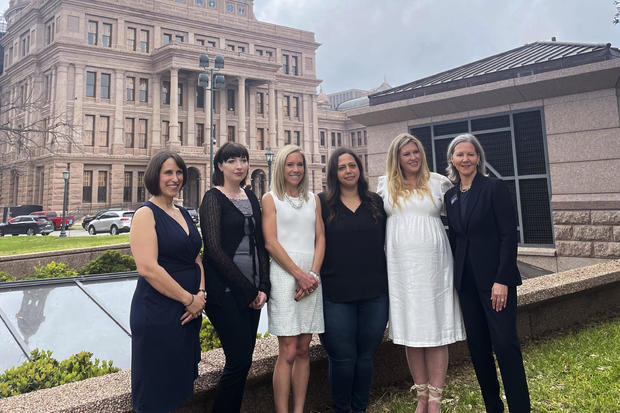Austin, Texas — A group of women and two doctors are suing the state of Texas after the women were denied abortions in the state despite facing what they say were serious risks to their health or the health of the fetuses. The lawsuit filed Tuesday seeks to clarify what qualifies as a medical exception to the law rather than overturn Texas’ abortion bans.
“I will never forget when one specialist tore off his mask and threw it in the trash,” one of the plaintiffs, Lauren Miller, said Tuesday outside the Texas State Capitol at a press conference announcing the lawsuit.
Miller said she was pregnant with twins when one of the fetuses was diagnosed with Trisomy 18 — a rare chromosome disorder that can cause severe physical and developmental disabilities, according to the National Institutes of Health.
“‘I can’t help you anymore,'” Miller recalled the specialist telling her. “You need to leave the state.”
Remaining pregnant with that fetus would put her health and the health of the other fetus at risk, she said. She eventually ended up traveling to Colorado to receive an abortion. She is due to deliver the other baby this month.
The plaintiffs said Tuesday they were denied abortions because their conditions were either not yet considered life-threatening, or because cardiac activity could be detected in the fetus but it had no chance of surviving outside the womb.
The lawsuit alleges that there is confusion among doctors over what qualifies as critical care.
“Some of the interviewed clinicians reported that, based on legal guidance, they do not believe they can even counsel patients regarding ‘the availability of abortion in cases of increased maternal risks or poor fetal prognosis, although before SB8 they would have done so,'” the lawsuit said.
Acacia Coronado / AP
The seven plaintiffs filed the lawsuit against the state of Texas, Attorney General Ken Paxton, the Texas Medical Board and its executive director.
In response, Paxton’s office said he is “committed to doing everything in his power to protect mothers, families, and unborn children, and he will continue to defend and enforce the laws duly enacted by the Texas Legislature.” His office also sent a memo that it had originally circulated in July 2022 after the Supreme Court overturned Roe v. Wade.
The law, Paxton’s memo said, states a “person may not knowingly perform, induce, or attempt an abortion unless the mother has ‘a life-threatening physical condition aggravated by, caused by, or arising from a pregnancy that places [her] at risk of death or poses a serious risk of substantial impairment of a major bodily function unless the abortion is performed or induced.'”
SB8, the Texas law that banned abortion after about six weeks of pregnancy, went into effect in September 2021, and the Supreme Court in December 2021 refused to block the law amid legal challenges. A “trigger law” banning all abortions in the state then went into effect in August 2022 after Roe was overturned.
The Center of Reproductive Rights, which filed the lawsuit on behalf of the women, said it hopes to bring forward legislation targeting other states’ abortion laws as well.
“Abortion bans are hindering or delaying necessary obstetrical care,” the lawsuit alleges. “And, contrary to their stated purpose of furthering life, the bans are exposing pregnant people to risks of death, injury, and illness, including loss of fertility — making it less likely that every family who wants to bring children into the world will be able to do so and survive the experience. Medical professionals are now telling their patients that if they want to become pregnant, they should leave Texas.”
Amanda Zurawski, who attended the State of the Union as first lady Jill Biden’s guest, said Tuesday that she hoped that the lawsuit would encourage more women to come forward. Zurawski said she was diagnosed with cervical insufficiency and preterm pre-labor rupture of membranes, meaning the fetus would not survive and her life was at risk. She said she was denied medical care at an Austin hospital because a fetal heartbeat could still be detected. It was only after she developed sepsis, a life-threatening infection, that she was able to get an emergency abortion, she said.
The women stressed on Tuesday that these had been wanted pregnancies. One plaintiff, Anna Zargarian, broke down in tears describing when she learned in December 2021 — shortly after SB8 was upheld — that she was at severe risk of infection, hemorrhage and sepsis, and that there was no chance her fetus would survive.
“I begged my doctors to give me the care I needed,” Zargarian said. “Please just induce me while I’m still strong and healthy. There must be an exception to this situation. They said they wanted to help, but couldn’t under Texas law. Where else in medicine can we do nothing and just see how sick a patient becomes before acting?”
Finally, she said, one doctor told her she was “wasting her time” trying to get care, and “in my cloud of grief,” she spent the next few hours coordinating flights, hotels and trying to find an out-of-state abortion clinic that could schedule a procedure immediately.
“I’m still upset that Texas robbed me of that time, to breathe and grieve and to take in what was happening to us,” she said.

 Latest Breaking News Online News Portal
Latest Breaking News Online News Portal





